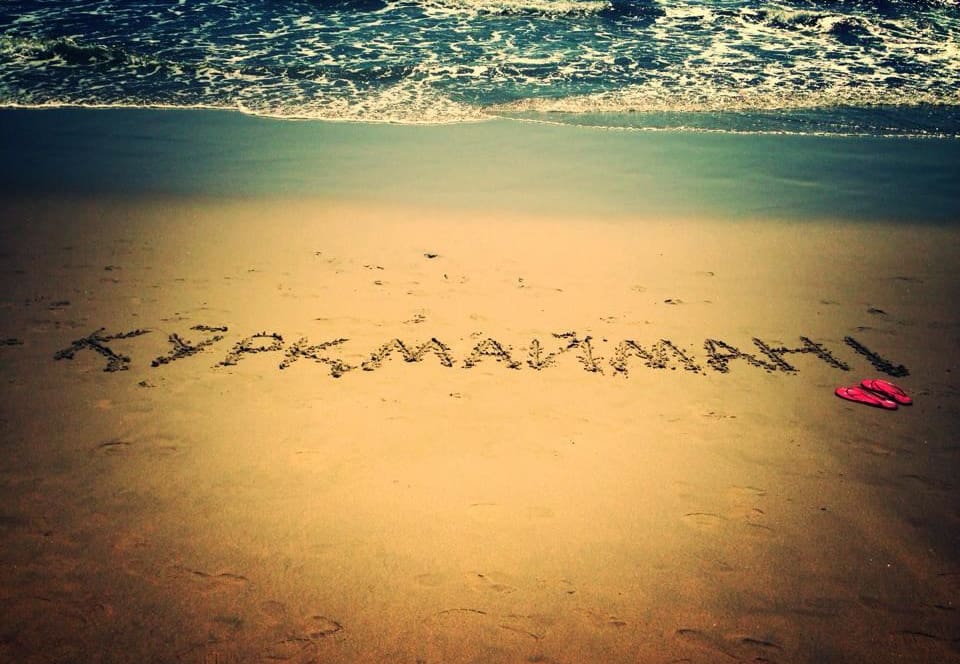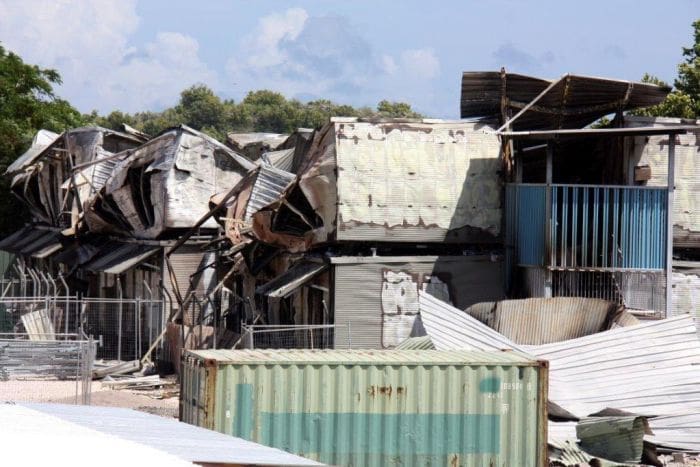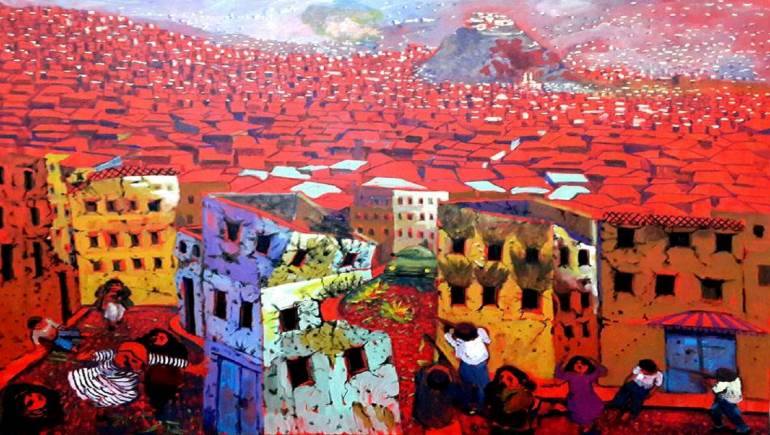Transcribed from the 25 July 2015 episode of This is Hell! Radio and printed with permission. Edited for space and readability. Listen to the whole interview:
[soundcloud url=”https://api.soundcloud.com/tracks/216442107″ params=”auto_play=false&hide_related=false&show_comments=true&show_user=true&show_reposts=false&visual=true” width=”100%” height=”450″ iframe=”true” /]
“Ironically, what the Andijan massacre did was lead to the creation of a network of all these different dissident groups putting out publications, an entire archive of dissident culture online.”
Chuck Mertz: This is Hell! correspondent Sarah Kendzior’s article We Are Not Afraid: Inside an Uzbek Internet Rebellion appeared this week at Foreign Policy. Sarah is a St. Louis-based writer and analyst who studies digital media and politics in authoritarian states. She has a PhD in anthropology from Washington University; her work has been published by Al Jazeera, The Atlantic, Slate, Radio Free Europe, and a whole bunch of academic journals.
Sarah, I have been comparing the real threat to Uzbeks from their government to the lack of real threat from crime that seems still to fuel the reason that Americans buy guns. We’re afraid of criminals despite historically low crime rates, but in Uzbekistan they are not afraid.
How real is the threat to Uzbeks by their own government compared to the threat of somebody breaking into your house right now and stealing everything you have?
Sarah Kendzior: The threat to Uzbeks from their own government is very real, especially to the kind of Uzbeks who have been posting criticisms of the government on web forums online. There are very few Uzbeks who participate in public protest, or any kind of written dissemination of works that critique the state. For them, it’s a big risk to speak out.
And since so many things can be misconstrued as criticism, even a subtle thing like saying, “Why don’t I have any electricity?” or “Why don’t I have any gas to heat my home?” is construed as government criticisms. Even saying something like that can be pretty risky.
If you’re writing from inside Uzbekistan, you could be visited by a local authority or a member of the SND, the heir to the Soviet KGB, who could interrogate you and tell you to stop, threaten members of your family, put you in jail. There’s not a real justice system. There’s an anti-justice system where punishment and interrogation tactics are arbitrary. You never know if you’re going to become the unfortunate victim of some kind of discrimination or persecution by the state.
That keeps people on edge, which is one of the reasons people are so afraid to speak out. The fact that some are doing so now is really remarkable.
CM: You mention the Andijan massacre in your article: “In 2005 the number of unacceptable websites exploded after dozens of journalists and activists were sent into exile following the Andijan massacre, the killing by state forces of over 700 Uzbeks who had gathered in protest in the city of Andijan that May. Forced abroad but able to access the internet regularly for the first time, the exiled Uzbeks created websites documenting the dictatorship and its discontents.”
So the massacre led people to flee the country and then report on how horrible it is in Uzbekistan. Without that massacre, where is this movement? Is the opposition in Uzbekistan the direct result of the dictatorship committing the massacre of 2005?
SK: There was an opposition in Uzbekistan beforehand, but one of the ironies of Andijan and the aftermath was that this opposition was never able to work together or to communicate with each other. If you were an opposition group and you published, say, a newspaper, all copies of your newspaper would be banned; they couldn’t be circulated. It was very difficult to reach people.
With the internet that’s changed. There’s internet censorship in Uzbekistan as there is under any authoritarian regime, and the opposition websites are blocked, but because most Uzbeks access the internet through social media, they are able to read a lot of the content anyway. So ironically, what Andijan did was lead to the creation of a network of all these different dissident groups putting out publications. For some of them it was their memoirs: some of them are republishing works from the nineties and early 2000s, and so there is this entire archive of dissident culture online, where in print it was disappearing rapidly.
But Uzbekistan went straight from being part of the Soviet Union, which was a very oppressive system, to becoming an even more oppressive system as an independent state. We’re seeing a lot of the same practices, particularly surveillance and spying, and intimidation by corrupt police.
So internet activists are struggling to come up with answers to questions like What kind of system do we want? And who should lead it? What kind of power structure should replace the one we have? Mostly they focus on exposing the crimes of the current government and especially of the secret police and low-level enforcement, things like crime and corruption within the state.
Still, that’s a big deal, because in Uzbekistan the official line is, “We are a paradise! We’re a country that’s faced down a global recession; we have a happiness rate of 95%!” Which, by the way, correlates to the rate of people who voted for President Karimov in his forced presidential reelection. They’re constantly putting it out there that everything is awesome and everybody’s happy and we all love the president and everything’s great. So even to point out that things are wrong, specific things that average Uzbeks can relate to, is notable.
CM: Last week we spoke with Delphine Schrank, author of The Rebel of Rangoon, on the Burmese resistance, and she talked about how the Burmese people are very happy, smiling, welcoming people despite the horrible circumstances that have led to miserable poverty.
So the Uzbek government says that 95% of Uzbeks are happy and so forth. How do they react to their dictatorship? Do they have that same bubbly personality Delphine sees from the Burmese, who are very upset about their dictatorship but at the same time keep a positive attitude?
SK: Uzbeks, especially if they’re talking to a foreigner, will keep a positive attitude just because they don’t want to be in trouble with the law, so it’s very difficult to ascertain what an average Uzbek person is thinking about the government unless you know them extremely well. Even with exiles who I know here in the United States, when they first met me, there was some reluctance to speak openly about certain matters. There was suspicion of me, wondering if I was some kind of a spy—why am I interested in Uzbekistan to begin with? There clearly must be something wrong with me. It takes a while to warm up.
On the other hand, there is this great tradition of hospitality. I’ve been invited to a lot of Uzbek homes, where they cook these elaborate dinners. It’s a mixed thing. People as human beings will relate to each other in a positive and friendly and extremely generous way. But underlying that in Uzbekistan is a culture of fear which makes people very reluctant to discuss political matters, and they would rather stay on a lighter topic.
“If this younger generation gains more power as time goes on, maybe incremental change could be made that would move Uzbekistan in a more positive direction. But as people like that tend to be rounded up and placed in prison, I’m not particularly optimistic.”
CM: You write, “While popular as a discussion site, the main purpose of Qorqmaymiz is for Uzbeks to post photos of themselves holding signs that say “I am not afraid,” meaning they are not afraid of the government of Islam Karimov, who has been Uzbekistan’s president since it became independent from the Soviet Union in 1991. Karimov’s government is regarded by human rights groups as one of the most brutal in the world.”
Are Uzbeks arguably worse off since the end of the Soviet Union? And if so, what is it about Uzbekistan that led it to having this kind of government in the post-Soviet era?
SK: I would argue that they are worse off, with the caveat that they weren’t very well off under the Soviet Union to begin with. During the Soviet time, Uzbek culture, religion, and language were banned, while they were encouraged to be good Soviets. So they lost touch with their own heritage, or struggled to preserve it. As an independent state, all those things came back, and Karimov tried to present himself as the exemplar of being a good Uzbek, but retained all the brutal practices of the Soviet Union.
For example, surveillance is a huge problem. The glue that holds Uzbekistan together is its elaborate security service, which is enormous. It’s the biggest in Central Asia. You’re very likely to be spied on. You’re likely to be interrogated. You’re likely to be pulled over and asked for bribes by police. All those things are just part of daily life. It’s unfortunate.
Uzbekistan has also, despite its own claims, experienced an economic decline. A lot of people are lacking basic resources nowadays, and this has really picked up in the last few years. I think if there is ever any kind of revolution or change in Uzbekistan, it might come more from people demanding things like heat and electricity and food out of pure desperation rather than out of any ideological agenda.
But I think change is unlikely. I’ve been studying this closely for ten years and things have changed very little. It’s steadily gotten worse. On the other hand, you never really know. A neighboring country, Kyrgyzstan, has experienced a lot of tumultuous change over the last ten years, a couple of upheavals changing the president, and what amounted to an ethnic massacre in 2010. All of those things were triggered by little events that became amplified by different people with different political agendas and spun out of control really fast.
No one really predicted what happened in Kyrgyzstan, including me. I definitely didn’t see it coming. So I don’t want to rule anything out for Uzbekistan. But the pattern since 1991, when the country was formed, has been a very slow, painful erosion. I think that’s the most likely thing to just continue for the future.
CM: You write, “Qorqmaymiz includes members of Uzbek opposition parties, all banned, as well as devout Muslim opponents to the Karimov regime. One frequent poster identifies himself in his Facebook profile as the ‘general mayor of Hisb-ut Tahrir,’ a banned group seeking to form a caliphate in Central Asia.”
Is the alternative right now, to the current dictatorship in Uzbekistan, another Islamist state?
SK: That’s what the government of Uzbekistan would love everyone to think. That’s one of the ways that they justify their power. And actually there are parallels between the kind of propaganda that the Uzbek government uses and that which the US used particularly during the Bush Administration and the War on Terror, where every threat from an Islamic group was overstated and used to justify a clampdown on civil rights. Uzbekistan’s government does that all the time.
I don’t think that an Islamic caliphate is necessarily the only alternative at all. There are a lot of younger Uzbeks who are fed up with the traditional opposition, fed up with the Karimov government, and also not attracted to fundamentalist Islam—who sometimes look to Islam as a source of moral guidance, but it’s a very different thing and often a very positive thing. A lot of this younger generation focuses more on pragmatic issues. How do we deal with bribery? How do we deal with corruption? How do we just make day-to-day living better, easier for people, so people don’t have to live such painful lives?
Hopefully if this younger generation gains more power as time goes on, maybe incremental change could be made that would move Uzbekistan in a more positive direction. But as people like that tend to be rounded up and placed in prison, I’m not particularly optimistic.
CM: You write, “Exiles stress that the Uzbek culture of fear crosses borders, as do agents of the state. Since the Andijan massacre, there have been a number of prominent Uzbek activists shot or murdered abroad, including journalist Alisher Saipov in Kyrgyzstan in 2006, activist Fuad Rustamxojaev in Russia in 2011, imam Obidxon qori Nazarov in Sweden in 2012, and sheikh Abdullo Bukhariy in Turkey in 2014. Uzbek authorities have targeted the families of exiles and others to punish those who participate in anti-state activism. Even for Uzbeks abroad, asserting their noncompliance with the regime is risky.”
Would you call the Uzbek government a state sponsor of terrorism? And are they defined as such in the international community?
“For real change to come to Uzbekistan, things like the security services, the surveillance system, the prison and court system—they don’t need reform, they need to be eliminated.”
SK: They are not defined as such in the international community. People, if they’re being critical, would label it an authoritarian state or a dictatorship in a more traditional way. But extra-judicial assassinations are a form of terrorism, so I don’t think it’s a stretch to call them that.
There have been relatively few concrete examples of Uzbekistan sending state agents across borders to assassinate people, but there have been enough, and they have been high-profile enough cases that they’ve really intimidated and frightened Uzbeks who live abroad. A lot of Uzbek dissidents who do things like post pictures of themselves holding “I am not afraid” signs on Qorqmaymiz were very afraid following the shootings of these individuals, because it meant that no matter where they went they were never going to be free of their government, they were never going to be protected and safe. That culture of fear extends to them. It makes people very suspicious, it makes them very paranoid.
As I‘ve said, it often takes years to establish a trusting relationship with Uzbeks here in America, because they never know who is out to get them. And for good reason. This has really happened. The government really has killed people abroad, and that’s a very scary thing to contemplate wherever you are.
And unfortunately because so many of the Uzbeks participating in criticism of the state are outside of the country, it’s hard to say whether this internet protest and the risks it entails will have an impact. I don’t think that protest is ever enough. I think protest is good and healthy, but it’s never enough, especially when you’re dealing with a dominating power structure like that in Uzbekistan.
For real change to come to Uzbekistan, things like the security services, the surveillance system, the prison and court system—they don’t need reform, they need to be eliminated. They need to start from scratch. Because those are the systems that are really holding people back.
It’s not so much about embracing new ideas or ideology; it’s about not living in constant terror that you might be arrested or you might lose your home or you might have to pay the government some obscene sum of money or lose your business. Those are all things that people are dealing with, and it’s very hard to move to asking what kind of state or society we want when you’re dealing with this day-to-day suffering on that level.
CM: You wrote in your article about an internet “rebellion.” Because of your experience in studying Central Asia and studying the sort of dictatorship that you describe in Uzbekistan, has this made you any more sensitive to ideas like social media restrictions here in the US?
Because unfortunately, like most women who post their ideas online, you have been the target of some very negative posts on social media and in emails. So despite that horrible, awful experience, has your studying of places like Uzbekistan made you more sensitive to any kind of limits or restrictions put on social media?
SK: Uzbeks are using the internet for protest that would be impossible on the ground, and using the internet to communicate when you’re otherwise unable to. Which is positive. But they deal with the same kinds of problems that I deal with and other people do, too. Trolling and malicious rumor campaigns, all of that is a big part of Uzbek dissident culture as well, and it’s really marred their interactions.
For them it’s different, because they immediately wonder, when someone is writing nasty things about them: is this an agent of the state? Is this somebody employed by the government whose official job it is to discredit me? That’s not something that most people in the West necessarily come to as their first conclusion.
But I found out while doing research for this article that the Uzbek word for trolling is “trolling,” and it’s enough of an issue for them that it’s been incorporated into Uzbek vocabulary. Uzbek as a language, by the way, has at least a dozen different words for gossip, and many different verb tenses that show how much bullshit, basically, is incorporated into any statement. It’s literally part of their grammar.
They struggle with these kinds of things already, and when you add internet anonymity to all of this, you really end up with a mess. So while I think the internet has been very positive for Uzbek people because it’s allowed them a freedom of speech and organization that they don’t have on the ground, there’s a dark side for them as well.
CM: Sarah, always great to hear your voice. Enjoy the rest of your weekend.
SK: You too, thank you.
Featured image source: Ozodlik.org / Radio Free Europe





